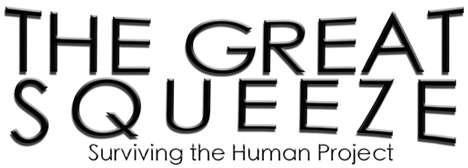
Before watching The Great Squeeze, I thought the best environmental / social documentary ever made was What A Way To Go: Life At The End Of Empire. After watching The Great Squeeze, that hasn’t changed, which isn’t surprising, but a little disappointing. Actually, the web site doesn’t promise an awful lot, but it was enough to make me spend the next — rather short, given the list price — 67 minutes of my life watching carefully for something that would really make me think and question (or reinforce) my values, and perhaps give me some good, practical advice to act upon.
It did, indeed, start off as a slightly lighter version of What A Way To Go, with a mixture of archive footage, rather doom-laden narration (not quite on a par with Tim Bennett), serious music and a few expert comments in front of suitable backdrops; and, to be honest, I could imagine a great many people making some very valuable intellectual connections. The talking heads featuring James Kunstler and Richard Heinberg were particularly illuminating at times, and half an hour in a lot of information had been conveyed — all of it familiar to me, but none of that I could really disagree with.
At that point it would have been a good point to say, “So much for the bad news, now lets diagnose the root of the problem”, and go into a hard-hitting exposée of how we managed to get where we are: it was not to be. What happened instead was akin to a National Geographic documentary — the voice-over began to grate, the music became noticable and the vital message of overstretched civilizations became lost in an odd dullness. Ironically this was exactly the point at which the audience really needed to be woken up and told the straight facts: that the problem isn’t merely too much of everything, it is something we now think of as fundamental to what we are as a species — Civilization itself.
By about 45 minutes, The Great Squeeze was becoming unsure of itself: despite stating absolute truths about the fate of civilizations throughout history, it appeared to be steering a course towards the salvage of our culture; almost as though the writers had taken fright with the solution that was staring them in the face. Heinberg and Kunstler were dancing around “solutions” that involved fundamental changes of scale, within the framework of civilization (I was still wondering when the root cause of the global crisis was going to be revealed); Lester Brown, who presumably only appeared on condition he could plug his next book (!), took an even more conservative view, recommending a mere shuffling of the cards. And to make it worse, Heinberg — someone who I had hitherto considered something of a radical — suddenly copped out entirely, and started talking about ways of making politicians think differently!
Two authors, Ted Nordhaus and Michael Shellenberger, both staunch supporters of the need for continued economic growth (Great, what a pair to give a platform to!) then talked of the “new energy economy”, and still no one thought to question Industrial Civilization itself. I felt myself urging the documentary to make that vital breakthough, and it almost happened when Heinberg brought up the need to connect with nature.
Then, abruptly, it ended.
Nothing about fighting back, undermining the killing machine…instead, a lovely song of hope. My view is, if you have nothing constructive to say, then don’t bother saying it: the first half an hour on its own would have been a good mini-doc to put out on its own; as it was, the whole piece failed to deliver anything that would resonate with anyone but those searching for the answer within our current way of living. Sorry, but you won’t find any answers there.